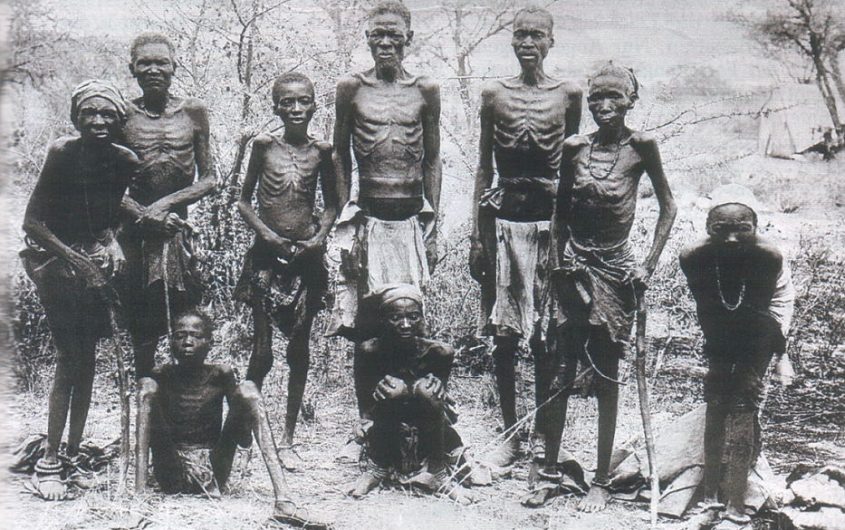
The First Genocide of the Twentieth Century

Elise Pape
Maison Interuniversitaire des Sciences de l'Homme -Alsace
Dr. Elise Pape was a DAAD/AICGS Research Fellow in July and August 2017. Dr. Pape completed her binational German-French dissertation in the field of sociology of migration at the Goethe University in Frankfurt am Main, Germany, and at the University of Strasbourg, France, in 2012. She has been an Assistant Professor at the University of Strasbourg (2012-2014) and a postdoc at the Ecole des Hautes Etudes en Sciences Sociales (EHESS) in Paris since 2014. Her research interests concern current postcolonial debates in Germany and France, intergenerational transmission in migration processes, social policies, and the use of biographical interviews in social research.
While at AICGS, Dr. Pape conducted research on her project, “Transatlantic Dynamics in Ongoing Postcolonial Negotiations – The Recognition of the Genocide of the Herero and Nama in Germany and in the United States.” The genocide of the Herero and Nama, committed between 1904 and 1908 under German colonial rule in today’s Namibia, is considered the first genocide of the twentieth century. Over the past decades and especially since the commemoration of the genocide’s centennial in 2004, when the German government refused to recognize the crimes committed as such, efforts led by descendants of the survivors to recognize the genocide and negotiate reparations have intensified.
This research focuses on the impact of Herero and Nama activists living in the United States on the ongoing negotiations between the German and the Namibian governments. Based on biographical interviews with Herero and Nama activists living in the United States, it will aim to grasp how the migration path of the interviewees has evolved over time and has affected their strategies, how the U.S. context has impacted their actions and how their transnational experiences and activities have opened up possibilities for transnational or post-national memories.
The recent handover of the remains of 27 individuals from Namibia that took place at the French Friedrichstadt Church in Berlin marked an important milestone in the process of questioning and challenging anthropological collections in Germany and its connections with the country’s colonial past. The restitution followed two previous handovers of human remains in Germany in 2011 and 2014, during which remains of a total of 55 individuals were restituted to Namibia. The human remains handed over on August 29, 2018 come from German universities and museums in Berlin, Hamburg, Greifswald, Hanover, Witzenhausen, and Jena, as well as from a private collection.
The activists engaged in the struggle for recognition and reparation of the genocide of the Herero and Nama—for the most part descendants of the survivors of the genocide themselves—have played a central role in triggering the restitutions in 2011, 2014, and 2018. First restitution claims by Herero and Nama activists in 2008 in fact led to the realization of the interdisciplinary “Charité Human Remains Project” that was launched at the Charité, Berlin’s university hospital and that was funded by the German Research Foundation from 2010 to 2013. This project to a large extent aimed to conduct provenance research on relevant parts of Berlin’s anthropological collections in order to provide a basis for the negotiations concerning the demands of restitutions.
The central importance of the activists in triggering and maintaining the current political negotiations between Germany and Namibia stands in contrast to their marginalization in the political negotiations themselves. The ongoing negotiations regarding the recognition and the reparation of the genocide are conducted between German and the Namibian government, which is composed in majority of members of ethnic groups that have not experienced the genocide. In a similar vein, the Paramount Chief of the Herero, Vekuii Rukoro, was not officially invited to the ceremony of handover of human remains in August 2018. Following a question of a member of the German Bundestag, Niema Movassat, the German Federal Foreign Office responded that the German government had offered to cover the travel costs for 25 traditional leaders from Namibia and that it had let the Namibian government define who these would be. Currently, Herero and Nama groups have not been invited as official parties at the ongoing Second Land Conference of Namibia that is taking place from October 1-5, 2018.
As a result of the genocide committed under German colonial rule, Herero and Nama today form minority groups in Namibia and are marginalized on different levels. The ongoing process of negotiation between the German and Namibian government concerning the recognition and reparation of the genocide of the Herero and Nama will surely raise numerous more questions and challenges in the near future on nation building processes after genocide—and on how international relations impact, challenge, or reify power relations deriving from past colonial crimes.
Dr. Elise Pape was a DAAD/AGI Research Fellow in 2017, working on a project entitled, “Transatlantic Dynamics in Ongoing Postcolonial Negotiations – The Recognition of the Genocide of the Herero and Nama in Germany and in the United States.”







